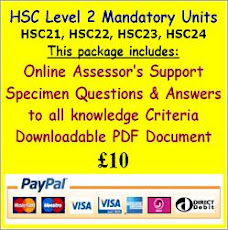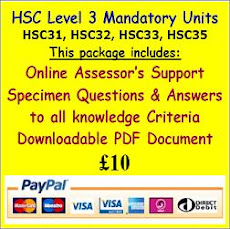This is a task that you will be required to do at the beginning of your NVQ, shortly after registration forms have been completed. Your assessor should complete a skill scan with you which is a short discussion about your job role and activities you carry out regularly at work. This discussion should be recorded in a form called a skill scan; the format of the form differs from centre to centre.
Sometimes candidates think they can choose a unit that they would like to explore new skills and knowledge on but unfortunately this is not the main objective of going through an NVQ rather it is to assist you package your experience and competence on your job into a certificate for which you need sufficient, valid, reliable and authentic evidence. Therefore your choice of optional units should be based on what you do regularly and you can present evidence using different methods including direct observation at work by your NVQ Assessor.
See below a list of units option codes for both NVQ 2 and NVQ 3 (Adults) and their respective titles:
To gain the full NVQ Level 2 all four mandatory units and two optional units must be achieved, this makes a total of 6 units.
Level 2 Mandatory Units
HSC21: Communicate with, and complete records for individuals
HSC22: Support the health and safety of yourself and individuals
HSC23: Develop your knowledge and practice
HSC24: Ensure your own actions support the care, protection and well-being of individuals
Level 2 Optional Units
HSC25: Carry out and provide feedback on specific plan of care activities
HSC26: Support individuals to access and use information
HSC27: Support individuals in their daily living
HSC28: Support individuals to make journeys
HSC29: Support individuals to meet their domestic and personal needs
HSC210: Support individuals to access and participate in recreational activities
HSC211: Support individuals to take part in development activities
HSC212: Support individuals during therapy sessions
HSC213: Provide food and drink for individuals
HSC214: Help individuals to eat and drink
HSC215: Help individuals to keep mobile
HSC216: Help address the physical comfort needs of individuals
HSC217: Undertake agreed pressure area care
HSC218: Support individuals with their personal care needs
HSC219: Support individuals to manage continence
HSC220: Maintain the feet of individuals who have been assessed as requiring help with general foot care
HSC221: Assist in the administration of medication
HSC222: Support individuals prior to, during and after clinical procedures
HSC223: Contribute to moving and handling individuals
HSC224: Observe, monitor and record the conditions of individuals
HSC225: Support individuals to undertake and monitor their own health care
HSC226: Support individuals who are distressed
HSC227: Contribute to working in collaboration with carers in the caring role
HSC228: Contribute to effective group care
HSC229: Gain access to, and ensure individuals’ homes are secure
HSC230: Manage environments and resources during clinical activities
HSC232: Protect yourself from the risk of violence at work
To gain the full NVQ Level 3 all four mandatory units and four optional units must be achieved, this makes a total of 8 units.
Level 3 Mandatory Units
HSC31: Promote effective communication for and about individuals
HSC32: Promote, monitor and maintain health, safety and security in the working environment
HSC33: Reflect on and develop your practice
HSC35: Promote choice, well being and the protection of all individuals
Level 3 Optional Units
HSC328: Contribute to care planning and review
HSC329: Contribute to planning, monitoring and reviewing the delivery of service for individuals
HSC330: Support individuals to access and use services and facilities
HSC331: Support individuals to develop and maintain social networks and relationships
HSC332: Support the social, emotional and identity needs of individuals
HSC333: Prepare your family and networks to support individuals requiring care
HSC334: Provide a home and family environment for individuals
HSC335: Contribute to the protection of individuals from harm and abuse
HSC336: Contribute to the prevention and management of abusive and aggressive behaviour
HSC337: Provide frameworks to help individuals to manage challenging behaviour
HSC338: Carry out screening and referral assessment
HSC339: Carry out assessment to identify and prioritise needs
HSC340: Carry out comprehensive substance misuse assessment
HSC341: Help individuals address their substance use through an action plan
HSC342: Assess and act upon immediate risk of danger to substance users
HSC343: Support individuals to live at home
HSC344: Support individuals to retain, regain and develop the skills to manage their lives and environment.
HSC345: Support individuals to manage their financial affairs
HSC346: Support individuals to manage direct payments
HSC347: Help individuals to access employment
HSC348: Help individuals to access learning, training and development opportunities
HSC349: Enable individuals to access housing and accommodation
HSC350: Recognise, respect and support the spiritual well-being of individuals
HSC351: Plan, agree and implement development activities to meet individual needs
HSC352: Support individuals to continue therapies
HSC353: Interact with individuals using telecommunications
HSC354: Counsel Individuals about their substance use using recognised theoretical models
HSC355: Counsel groups of individuals about their substance use using recognised theoretical models
HSC356: Support individuals to deal with relationship problems
HSC357: Carry out extended feeding techniques to ensure individuals’ nutritional and fluid intake
HSC358: Identify the individual at risk of skin breakdown and undertake the appropriate risk assessment.
HSC360: Move and position individuals
HSC361: Prepare for and undertake physiological measurements
HSC362: Recognise indications of substance misuse and refer individual to specialists
HSC363: Test for substance use
HSC364: Identify the physical health needs of individuals with mental health needs
HSC365: Raise awareness about substances, their use and effects
HSC366: Support individuals to represent their own needs and wishes at decision-making forums.
HSC367: Help individuals identify and access independent representation and advocacy
HSC368: Present individuals’ needs and preferences
HSC369: Support individuals with specific communication needs
HSC370: Support individuals to communicate using technology
HSC371: Support individuals to communicate using interpreting and translation services
HSC372: Plan and implement programmes to enable individuals to find their way around familiar environments
HSC373: Plan and implement programmes to enable individuals to find their way around unfamiliar environments
HSC374: Provide first aid to an individual needing emergency assistance
HSC375: Administer medication to individuals
HSC376: Obtain venous blood samples
HSC377: Encourage and support individuals undergoing dialysis therapy at home
HSC378: Insert and secure urethral catheters and monitor and respond to the effects of urethral catheterisation
HSC379: Support individuals who are substance users
HSC380: Supply and exchange injecting equipment for individuals
HSC381: Support individuals through detoxification programmes
HSC382: Support individuals to prepare for, adapt to and manage change
HSC383: Prepare and support individuals to move and settle into new living environments
HSC384: Support individuals through bereavement
HSC385: Support individuals through the process of dying
HSC386: Assist in the transfer of individuals between agencies and services
HSC387: Work in collaboration with carers in the caring role
HSC388: Relate to families, parents and carers
HSC389: Work with carers, families and key people to maintain contact with individuals
HSC390: Support families in maintaining relationships in their wider social structures and environments
HSC391: Provide services to those affected by someone else’s substance use
HSC392: Work with families, carers and individuals during times of crisis
HSC393: Prepare, implement and evaluate agreed therapeutic group activities
HSC394: Contribute to the development and running of support groups
HSC395: Contribute to assessing and act upon risk of danger, harm and abuse
HSC396: Enable people with mental health needs to develop coping strategies
HSC397: Reinforce positive behavioural goals during relationships with individuals
HSC398: Contribute to assessing the needs of individuals for therapeutic programmes to enable them to manage their behaviour.
HSC399: Develop and sustain effective working relationships with staff in other agencies
HSC3100: Participate in inter-disciplinary team working to support individuals
HSC3101: Help develop community networks and partnerships
HSC3102: Work with community networks and partnerships
HSC3103: Contribute to raising awareness of health issues
HSC3104: Support the development of networks to meet assessed needs and planned outcomes.
HSC3105: Contribute to the recruitment and placement of volunteers
HSC3106: Plan, organise and monitor the work of volunteers
HSC3107: Lead and motivate volunteers
HSC3108: Facilitate learning through presentations and activities
HSC3109: Facilitate group learning
HSC3110: Support colleagues to relate to individuals
The following are Additional units which provide opportunities for professional development, and to meet employer needs for specific job roles. Candidates can't use Additional Units instead of Optional Units, but they are available to candidates and their centres through their registration period.
HSC3111: Promote the equality, diversity, rights and responsibilities of individuals
HSC3112: Support individuals to identify and promote their own health and social well being
HSC3119: Promote the values and principles underpinning best practice
NB: Please note there are forbidden unit combinations; please check with your assessor before undertaking any combination.
Why NVQ Made Simple is Your Best Pathway
1 month ago



No comments:
Post a Comment